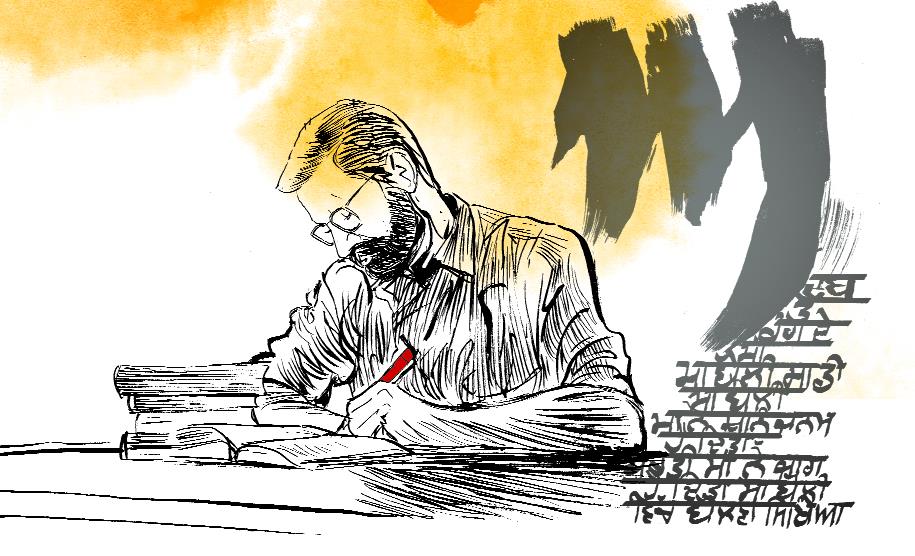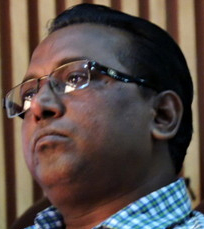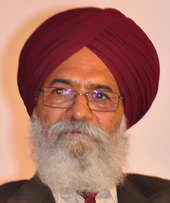
Illustration by Sandeep Joshi
Sarika Sharma
Ma boli, saaddi ma boli
Bacheyaan nu hai dindi lori
Ma ne sanu janam hai ditta
Dharti ma ne jagah hai ditti
Ma boli vich bolna sikheya
Ma boli ne maan vadhayaa…
Tinna ton vaddi ni maaya
Ma de charna ch sis navaya
Mil ke asi pyaar vadhaya
— Saadiyaan Tinn Maavaan by Aryan
They speak the language. They write poetry in it too. They talk about birds, earth, Bhagat Singh, azaadi, coolies… they talk about dreams. This one by a Class V student talks about three mothers — the mother who gives us birth, mother earth and mother language. Language, for kids like Aryan, is a strange phenomenon. His parents are from Uttar Pradesh but his poems are in Punjabi. Living in a slum near Grain Market in Patiala, does he too wonder about this predicament? Maybe not. Maybe it comes naturally to him. Just like his teacher, poet and translator Satpal Bhikhi, who was born in Punjab but traces his roots to Mainpuri in UP.
As it becomes a long journey home for some migrants and an endless wait for others in the times of the pandemic, there are migrants for whom Punjab is home and Punjabi the mother tongue. They may or may not have been born here, but they have known it enough to be able to read and write in it and loved it enough to be able to pursue literature, the highest form of creativity, in it.


I don’t know Mainpuri as well as Bhikhi. Punjabi is the language I converse in with my friends and family. I grew up on Punjabi literature, magazines like Nawan Zamana and Soviet literature that was available to us in Punjabi.

A teacher at the government elementary school in Grain Market, Satpal says he doesn’t know Mainpuri as well as he knows Bhikhi in Mansa where he was born. His father came here looking for work in 1961 and stayed on. “I just know Punjabi. I just know Punjabi culture. I love Punjabi language. This is my language. This is the only language I can express myself in,” says Bhikhi, who won the Sahitya Akademi’s highest award for children’s literature, Bal Sahit Puraskar in 2017. He has penned about 15 books for kids and translated world literature for them.


I don’t think a Punjabi-speaking/writing Bengali is an aberration. Why should I be? I was born and brought up here. This is what I am most at home. In fact, my Bengali is not as good as my Punjabi, but I can speak Pahari well too as my wife is one.

His brother Laxmi Narayan Bhikhi, 12 years elder to him, is also a prominent Punjabi poet and critic. He was a month old when they landed in Punjab. “Our father came here and engaged in agriculture. He was unlettered, but wanted us to study,” he recalls. Though not a conventionally bright student, he took to poetry early on, while still in school. Sympathetic to the Naxalite movement, he wrote progressive poetry and revolutionary songs.
Around the same time Pradeep Bose, whose father came to Punjab from Bengal to join his job with the Railways, was learning the uda, aida of Punjabi language. In the next decade, he was to be in the thick of literary action in Punjab, more specifically, Ludhiana. Studying to be a veterinary doctor at Punjab Agricultural University, he was the secretary of the Young Writers’ Association when his friend Pash was murdered and organised a gathering at PAU in protest. His first poem was published in Amrita Pritam’s Nagmani in 1976.


What is mother language? For me, this earth is mother. And people enrich each other’s languages. So many of our words have come from Persian. Come to think of it, even words such as ishq and rabb are not ours.

Now based in Rajasthan, Bose says his Bengali is not as good as his Punjabi. He may have left Punjab, but not Punjabi. His latest anthology of poems, Shehar de Khilaaf, has just been published. He says a Punjabi-speaking Bengali isn’t an aberration. “Why should I be?” he asks. “I was born and brought up here. This is what I am most at home.”
With native Punjabis opting to send their kids to private schools, kids of migrants labourers are mostly the only ones studying in government schools where Punjabi is the medium of instruction. Satpal’s students come from all over India — UP, Bihar, Odisha, Bengal… and, at times, from Nepal too. As teacher, he has been actively encouraging his students to express their creative instincts in Punjabi. Saadiyaan Tinn Maavaan by Aryan was part of his anthology of poems which came out in two volumes between 2016 and 2018. Satpal says he gave topics to kids, who penned several poems. The best ones made their way to the anthology. Rajni, a student of his, he proudly tells, won an award from the Punjabi Sahit Akademi, Ludhiana, too. “She wrote four books too. Sadly, she couldn’t pursue her studies. After Plus Two, her parents married her off. Dickens says poverty is a social disease. And when you are plagued by this disease, all other diseases follow. She had the potential, but life’s realities caught up with her. She quit writing.”
Rajni reminds one of Madhuri from Surjit Patar’s remarkable 1999 poem Aaya Nand Kishore:
In search of subsistence
arrived Nand Kishore
from faraway Bihar
in the train Sealdah
accompanied by many more.
---------------------------------------
With him was Ramkali
his wife, suave and gentle.
Close to Ludhiana
in a village Barewal
the roots took hold and germinated.
---------------------------------------
From the womb of Ramkali
took birth his daughter
who was named Madhuri.
Yesterday I saw Madhuri
in the same village school
with her plaits tied in ribbon
wiping clean her slate
writing Punjabi alphabet.
---------------------------------------
The daughter of Nand Kishore
writing Punjabi alphabet!
So deep is the relationship
between alphabets and subsistence…
(Translated by Gurshminder Jagpal)
The second half of the poem is about the village landlord’s grandsons going to a convent school in the city. Patar says this poem is his reflection on how a language lives and how it dies.
Aaya Nand Kishore inspired London-based Punjabi poet Amarjit Chandan to write an essay. He says the poem is a tale from early 1970s Punjab when the arrival of migrant labourers from UP and Bihar coincided with the migration of Punjabis to foreign lands and the alienation of new-rich Punjabis from themselves, their land and their language. However, the migrants were not welcomed in the new land. Local leaders were soon spewing venom against them. But they were here already, and here they are today, adopting the land and learning the language it speaks.
Recalling the essay written in 2000, Chandan says it saddens him to see Madhuri is denied the basic human right of getting an education in her mother tongue. “Maybe she’d be a writer of Punjabi one day. But at what cost!” Chandan sometimes writes poetry in English, with which he has lived almost all his life. “But I still can’t enter the soul of English language. This is my sad predicament,” he says, but chooses to not comment on non-Punjabis writing poetry in the language which is not their blood language.
But poet Gurbhajan Gill is generous in his praise. “They first inherited a land and then they inherited its language,” he says. And that is why, for him, the Bhikhi brothers, Bose, singer Ravinder Grewal’s migrant lyricist, are all “brave people”.
‘Viewed differently if from UP, Bihar’
Poet Satpal Bhikhi says “you are automatically viewed differently in India if you are from UP, Bihar or from Kashmir”. Add to it economic and caste backwardness. “I don’t think this bias is as strong as it is when you are from elsewhere in India,” he says. Laxmi Narayan Bhikhi feels the Punjabi intelligentsia has failed the migrant. He says their heart bleeds for Punjabis abroad but they don’t see those who have migrated to their land in the same light. “One never sees them talk about the migrants’ rights.” He says people go abroad because there are no jobs for them here. “Same is true for those who come to Punjab, isn’t it?”
Join Whatsapp Channel of The Tribune for latest updates.



























